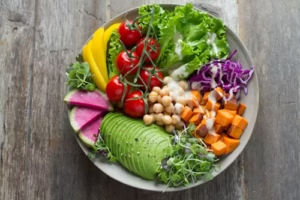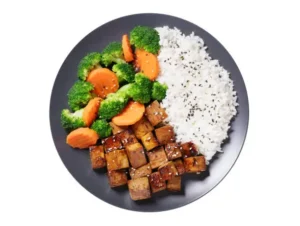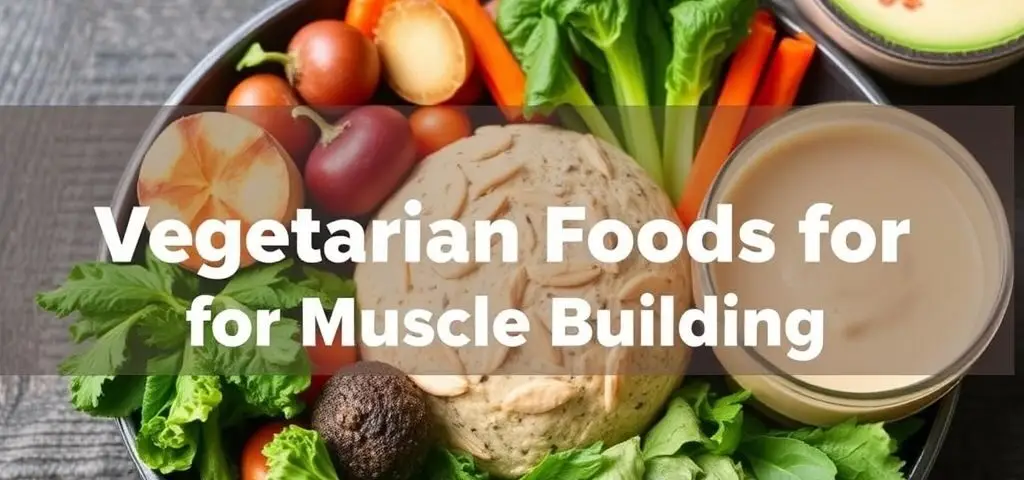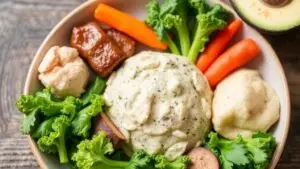If you’ve ever been told that you can’t build serious muscle on a vegetarian diet, it’s time to throw that myth out the window. Plant-based diets are no longer just about leafy greens and smoothies — they’re powerful, protein-rich, and more than capable of supporting impressive muscle growth. Protein Vegetarian Foods for Muscle Building
Whether you’re an athlete looking to pack on lean mass, a fitness beginner trying to gain strength, or simply someone who wants to feel stronger and healthier, high-protein vegetarian foods for muscle building can be your secret weapon.
Understanding Protein and Muscle Growth
Why Protein Matters
Protein is the building block of muscle tissue. Every time you lift weights or engage in resistance training, you create microscopic tears in your muscle fibers. Protein — specifically the amino acids it contains — helps repair and rebuild those fibers, making them stronger and larger over time.
How Much Protein Do You Need for Muscle Gain?
The recommended protein intake for muscle gain is generally 1.6 to 2.2 grams of protein per kilogram of body weight per day.
If you weigh 70 kg, that’s 112–154g of protein daily.
Vegetarians need to be mindful about getting a variety of protein sources to ensure all essential amino acids are covered.
Complete vs. Incomplete Proteins
Complete proteins contain all 9 essential amino acids (e.g., quinoa, soy, dairy, eggs).
Incomplete proteins lack one or more essential amino acids but can be combined to make a complete profile (e.g., rice + beans).
High-Protein Vegetarian Foods for Muscle Building
Let’s explore the best vegetarian-friendly protein sources that can supercharge your muscle growth.
1. Lentils
Protein Content: ~18g per cup (cooked)
Benefits: Rich in iron, folate, and fiber.
Tips: Use in soups, curries, or veggie burgers.
2. Chickpeas (Garbanzo Beans)
Protein Content: ~15g per cup (cooked)
Benefits: High in fiber and versatile.
Tips: Roast for snacks, add to salads, or blend into hummus.
3. Quinoa
Protein Content: ~8g per cup (cooked)
Benefits: Complete protein source, gluten-free.
Tips: Use instead of rice or in breakfast bowls.
4. Tofu
Protein Content: ~10g per 100g
Benefits: Low in fat, complete protein, absorbs flavors well.
Tips: Grill, stir-fry, or scramble eggs.
5. Tempeh
Protein Content: ~19g per 100g
Benefits: Fermented for better digestion, rich in probiotics.
Tips: Slice thin and pan-fry for a meaty texture.
6. Greek Yogurt
Protein Content: ~10g per 100g
Benefits: Rich in calcium, probiotics, and casein protein.
Tips: Eat with fruit, nuts, or as a smoothie base.
7. Cottage Cheese
Protein Content: ~14g per 100g
Benefits: Slow-digesting casein protein for overnight muscle repair.
Tips: Mix with berries or add to savory dishes.
8. Edamame
Protein Content: ~17g per cup (cooked)
Benefits: Great snack, high in fiber.
Tips: Steam and season with sea salt or chili.
9. Nuts & Seeds
Examples: Almonds, chia seeds, hemp seeds
Protein Content: Varies (Almonds ~6g/28g, Hemp ~10g/3 tbsp)
Tips: Add to smoothies, salads, or oatmeal.
10. Seitan
Protein Content: ~25g per 100g
Benefits: Wheat-based meat substitute, high protein density.
Tips: Stir-fry, grill, or use in sandwiches.
11. Black Beans
Protein Content: ~15g per cup (cooked)
Tips: Perfect in burritos, soups, or salads.
12. Pea Protein Powder
Protein Content: ~20g per scoop
Tips: Add to shakes or baked goods.
13. Spirulina
Protein Content: ~4g per tablespoon
Tips: Add to smoothies for a nutrient boost.
14. Soy Milk
Protein Content: ~7g per cup
Tips: Use in coffee, oatmeal, or shakes.
High Protein Foods for Muscle Gain (Vegetarian & Beyond)
While our focus is vegetarian, it’s helpful to compare plant-based protein to traditional options.
Meat-eaters get protein from chicken, fish, and beef.
Vegetarians can achieve similar results by combining multiple plant sources for amino acid completeness.
Key takeaway: The quality of protein matters — aim for a mix of complete and complementary sources.

Sample High-Protein Vegetarian Meal Plan
Breakfast:
Scrambled tofu with spinach, tomatoes, and whole grain toast (~30g protein)
Snack:
Greek yogurt with chia seeds and almonds (~20g protein)
Lunch:
Lentil and quinoa salad with roasted vegetables (~35g protein)
Snack:
Edamame with sea salt (~17g protein)
Dinner:
Tempeh stir-fry with brown rice and broccoli (~40g protein)
Daily total: ~142g protein
Common Mistakes to Avoid
Eating too little protein for your body weight
Ignoring the variety in protein sources
Forgetting about calorie surplus for muscle gain
Neglecting micronutrients like iron, B12, and zinc
Tips to Boost Protein Intake
Add nuts and seeds to every meal
Use plant-based protein powders in smoothies
Batch cook lentils, beans, and tofu for the week
Snack smart with roasted chickpeas or protein bars
Supplements for Vegetarian Muscle Building
Plant protein powders (pea, hemp, soy)
BCAAs for workout recovery
Creatine (vegan-friendly options available)
Nutritional Breakdown of High-Protein Vegetarian Foods
To help you plan better, here’s a detailed nutrition chart of the top high-protein vegetarian foods for muscle building (values are approximate and based on cooked/ready-to-eat form):
| Food | Serving Size | Protein (g) | Calories | Notes |
| Lentils | 1 cup cooked | 18g | 230 | Great for soups & curries |
| Chickpeas | 1 cup cooked | 15g | 270 | Perfect for salads/snacks |
| Quinoa | 1 cup cooked | 8g | 222 | Gluten-free, complete protein |
| Tofu (firm) | 100g | 10g | 144 | Absorbs flavors well |
| Tempeh | 100g | 19g | 195 | Fermented, gut-friendly |
| Greek Yogurt | 100g | 10g | 59 | High in calcium |
| Cottage Cheese | 100g | 14g | 98 | Great for night-time protein |
| Edamame | 1 cup cooked | 17g | 188 | Easy snack |
| Hemp Seeds | 3 tbsp | 10g | 170 | Rich in omega-3s |
| Almonds | 28g (23 nuts) | 6g | 164 | Healthy fats & protein |
| Black Beans | 1 cup cooked | 15g | 227 | High in fiber |
| Seitan | 100g | 25g | 143 | Very high protein |
| Pea Protein Powder | 1 scoop (30g) | 20g | 120 | Easy protein boost |
| Spirulina | 1 tbsp | 4g | 20 | Nutrient-dense superfood |
| Soy Milk | 1 cup | 7g | 80 | Fortified with vitamins |
Muscle Building Recipes (Vegetarian High Protein)
Adding variety to your diet will make hitting protein goals easier and tastier.
1. Lentil & Quinoa Power Bowl
Ingredients:
1 cup cooked lentils
1 cup cooked quinoa
Cup of steamed broccoli 1
Tbsp olive oil 1
Lemon juice, salt, pepper
Protein: ~26g per serving
2. Tempeh Stir-Fry
Ingredients:
200g tempeh (sliced)
Mixed vegetables (bell peppers, carrots, snow peas)
Soy sauce, garlic, ginger
Brown rice
Protein: ~38g per serving
3. Greek Yogurt Protein Smoothie
Ingredients:
200g Greek yogurt
1 scoop pea protein powder
Banana 1
Tbsp peanut butter 1
Almond milk
Protein: ~40g per serving
4. Edamame Snack Bowl
Ingredients:
1 cup boiled edamame
Sprinkle of sea salt & chili flakes
Protein: ~17g per serving
Integrating Protein with Training
Nutrition is only half the equation — muscle growth happens when you combine high-protein foods with resistance training.
Key tips:
Strength training 3–5x/week: Focus on compound lifts (squats, bench press, deadlifts).
Progressive overload: Gradually increase weight or reps to stimulate growth.
Post-workout protein: Aim for 20–40g protein within 1–2 hours after training.
Sleep & recovery: Muscles repair during rest, so aim for 7–9 hours per night.
Vegetarian Meal Plan for Muscle Gain (7-Day)
Day 1 Example:
Breakfast: Tofu scramble + whole grain toast (28g protein)
Snack: Greek yogurt with chia seeds (18g)
Lunch: Lentil quinoa salad (35g)
Snack: Edamame (17g)
Dinner: Tempeh stir-fry (38g)
Total: ~136g protein
(I can build out the full 7 days in a downloadable chart format.)

Bonus Tips for Faster Gains
Track your intake: Use MyFitnessPal or Cronometer.
Rotate protein sources to avoid boredom and ensure a complete intake of amino acids.
Stay hydrated: Adequate water is essential for protein metabolism.
Don’t fear carbs: They fuel your workouts and support muscle recovery.
Muscle growth on a vegetarian diet is not only possible — it can be incredibly effective if you plan your meals right. High protein vegetarian foods for muscle building give your body the amino acids it needs, while also providing fiber, vitamins, and minerals you won’t get from meat-heavy diets.
Conclusion
Building muscle on a vegetarian diet is 100% possible with the right approach. By focusing on high-protein vegetarian foods for muscle building, you’ll fuel your workouts, recover faster, and see results without relying on meat.
FAQs
- What vegetarian food has the most protein?
Seitan tops the list with about 25g of protein per 100g. - Can I build muscle without eating meat?
Yes, with proper protein intake, calorie surplus, and strength training. - How much protein should a vegetarian eat daily for muscle gain?
1.6–2.2g of protein per kg of body weight. - Is soy protein good for bodybuilding?
Yes, soy is a complete protein and supports muscle growth. - Do I need protein powder if I’m a vegetarian?
Not required, but it helps meet daily targets conventionally.


